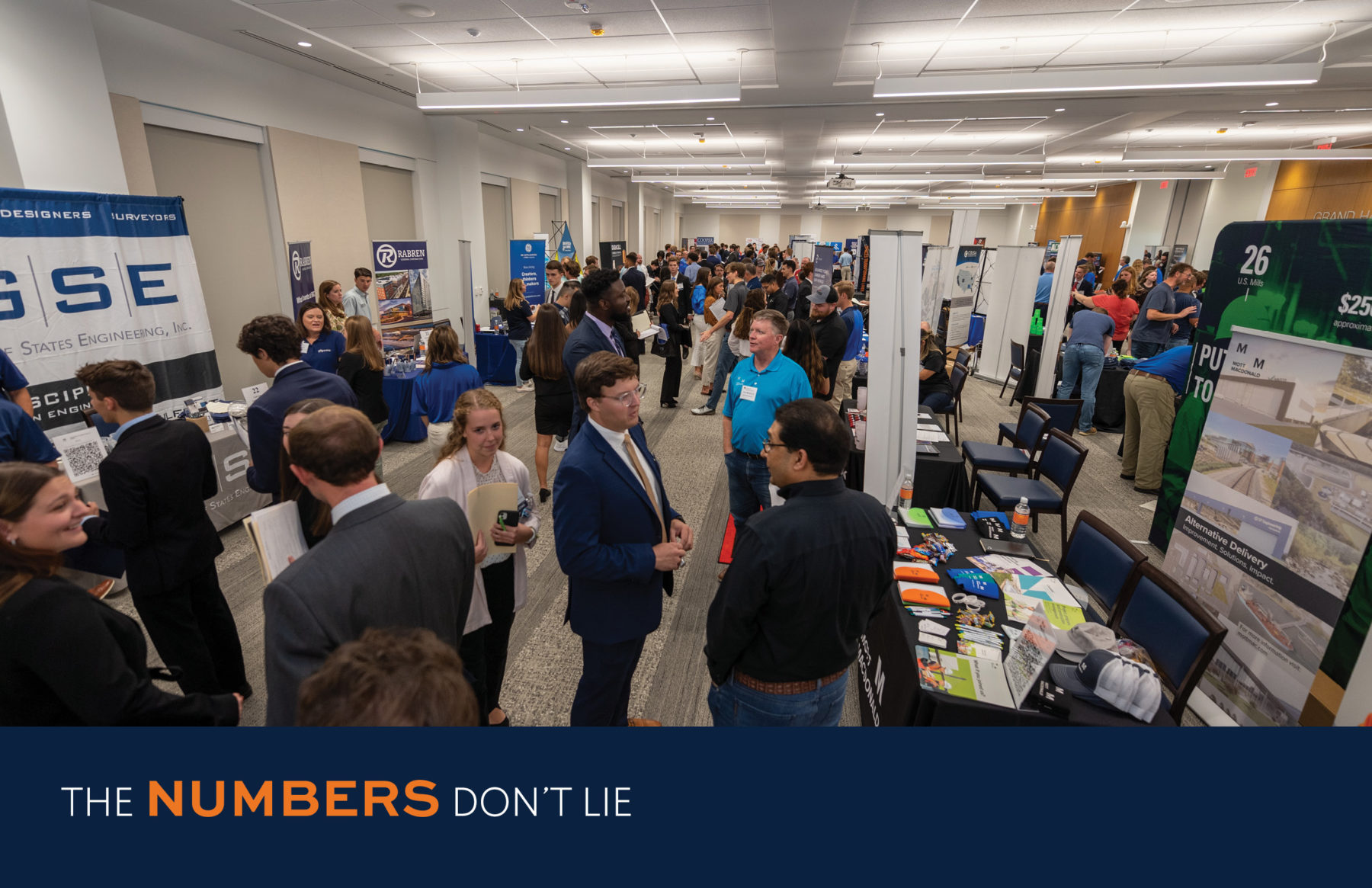
Located within the Brown-Kopel Center, the Office of Career Development and Corporate Relations (CDCR) offers students a wealth of career-related preparation services, not just in their final approach to graduation but from the moment they enter campus.
“We hear so many students as we work with them over time say, ‘I wish I had accessed the CDCR earlier,’” said Jessica Bowers, manager for career development content and strategy. “We spend a good deal of time with parents at Camp War Eagle while students are registering for courses. We know parents and family members are often the sounding boards in their students’ ears over the course of their education. Something we try to reinforce to them is that if their student will come in the door — they don’t even have to specifically know their question — but if they will come see us, we’ll get the conversation started with them about where to begin and how to approach things step-by-step.”
Since the office opened in 2018, establishing the College of Engineering’s own career office distinct from the university’s Office of Career Discovery and Success, CDCR has become an essential stop for students on their paths to graduation and finding purposeful careers. With four distinct branches — career coaching and programs; career development content and strategy; corporate relations; and cooperative education and internships — the CDCR team brings a collaborative approach to its work where each segment of the office informs the others, leading to the successful model at work today.
“We don’t just want our students to have a job when they graduate, we want them to have the best job,” said Apryl Mullins, assistant director for corporate relations. “We want them to be excited and empowered when they graduate about their career or their graduate program. We want them to feel like they were supported and cared for while they were here, and we want them to be positioned to have their best life when they graduate.”
Designing Engineering Careers
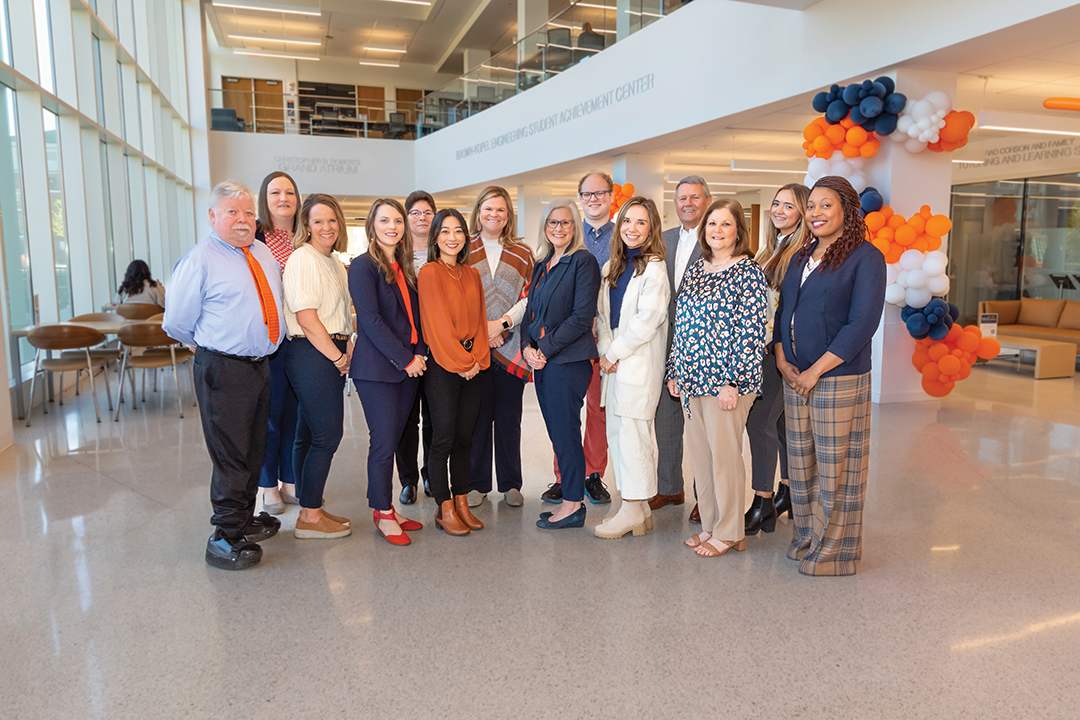
All Auburn Engineering students are training to become designers of some sort, whether that’s designing physical buildings and roads, or digital systems and processes. Why not train them to design their future careers, too?
“As they’re training to become engineers, they’re training to become designers. We describe the career design process in four parts: design, build, prototype and launch,” Bowers said. “It’s really intended to convey that this is a process and not something that happens overnight, but also to convey that it’s not linear — it’s not necessarily A+B=C when it comes to designing a career.”
Through the career design process, Bowers encourages students to think outside the box and explore all options available to them.
“They have the agency and ability to really explore what they want their career to be and build their way there,” she said.
Last year, Bowers and her team launched an outreach effort to connect with faculty to make in-class career development presentations available as an integrated part of the normal class curriculum.
“In spring 2022 we piloted for the first time the ability for faculty and staff who teach a course to submit a class presentation request,” Bowers said. “We received more than 45 requests in that first semester. In doing so, we reached more than 3,400 students inside classrooms where we delivered a presentation on a career development topic customized for students in the course.”
Such interactive presentations covered career development topics including how to approach career interests and planning from a design perspective. Other skills covered in class presentations included how to build a personal brand, using virtual tools and platforms such as LinkedIn, how to network and build connections with potential employers, and key networking rules such as how to request meetings with professional contacts or after an interview.
“I think this is a really important time in their careers where they need guidance beyond subject matter knowledge,” said Davide Guzzetti, assistant professor of aerospace engineering who hosted CDCR presenters in his Space Mission Design class in the spring of 2022.
For Bowers, incorporating career development topics in the classrooms signals to students the importance of considering these skills as part of their overall engineering education.
“The reason I see this as particularly meaningful is because the institution signals to students what is important, what is a priority, based on the content and materials integrated in the academic experience” she said. “When we integrate career development topics in the classroom, it signals to students that it matters and that there is a significance to spending time on it. It helps students prioritize it so they are prepared to seek full-time jobs by the time they need to conduct a job search in fall of their senior year.”
Building Students’ Confidence
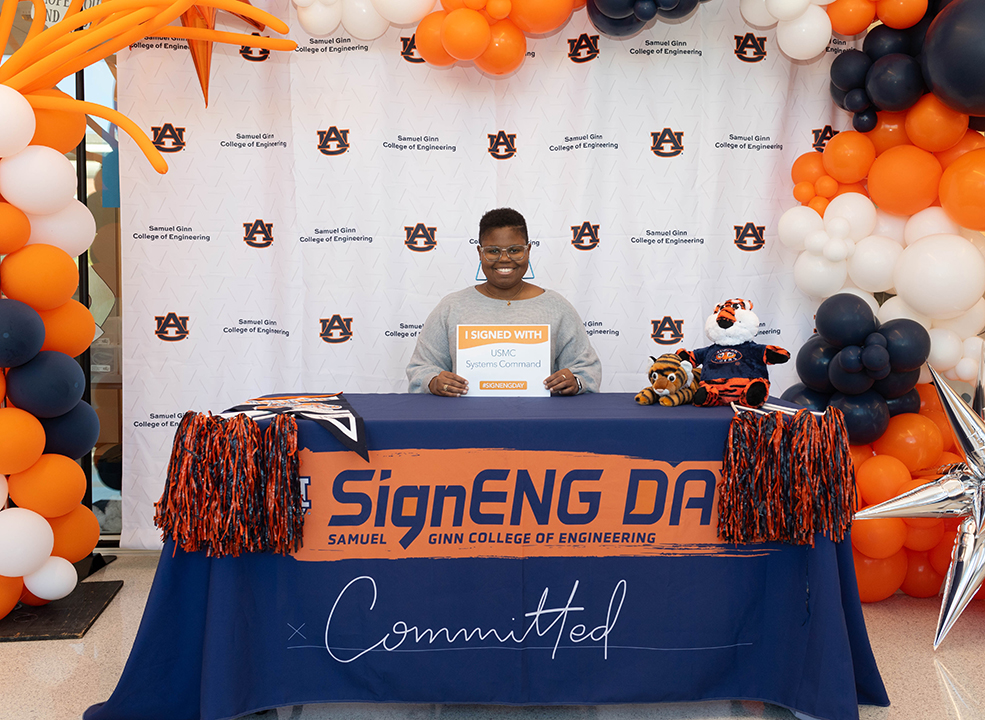
Before a student is ready to apply for a position or attend a career fair, much preparation work is done with the help of a career coach like Marissa Miller.
As the assistant director of career coaching and programs, Miller interacts with students on a daily basis, assessing where the student is in their career design process and offering tools to help the student grow their confidence and become a stronger candidate.
“Within a career coaching session, we focus predominantly on working one-on-one with students and being able to cover a variety of resources and strategies for how to think about designing that future career path, what are resources that are available for students and provide insight on effective ways to navigate provided resources,” Miller explained. “A lot of times with career services and career coaching, it’s a found resource and it’s one that we hope to uncover early and often for students.”
The office offers a wide variety of career coaching services, including career fair prep, resume and cover letter assistance, interview prep and mock interviews, as well as job and internship searching. Once an offer is received, career coaches are also on hand to navigate the particulars of job, co-op and internship offers and salary negotiations.
“We are here to be able to help build confidence and help students really think about how to articulate what they’re looking for and how to make a confident decision moving forward, whether that’s for an experiential learning experience or for a full-time job post-graduation,” Miller said.
Gaining Real-World Experience
For Jesus Barragan, a sophomore in electrical and computer engineering, seeking out services such as professional resume preparation and application reviews helped him secure a cooperative education position with Southern Company.
“My first week at Auburn University as a student, I went into Brown-Kopel so that I could find the co-op office and started looking into that process and the requirements for a co-op,” Barragan said. “The CDCR office was having an event just outside their office that same day. I was able to meet the recruiter and some employees of Southern Company as they were tabling at the event.”
Some may call it luck but to Barragan, it was fate. That initial conversation with Southern Company got his foot in the door and eventually helped him land a position as a protection and control field service engineer co-op student. 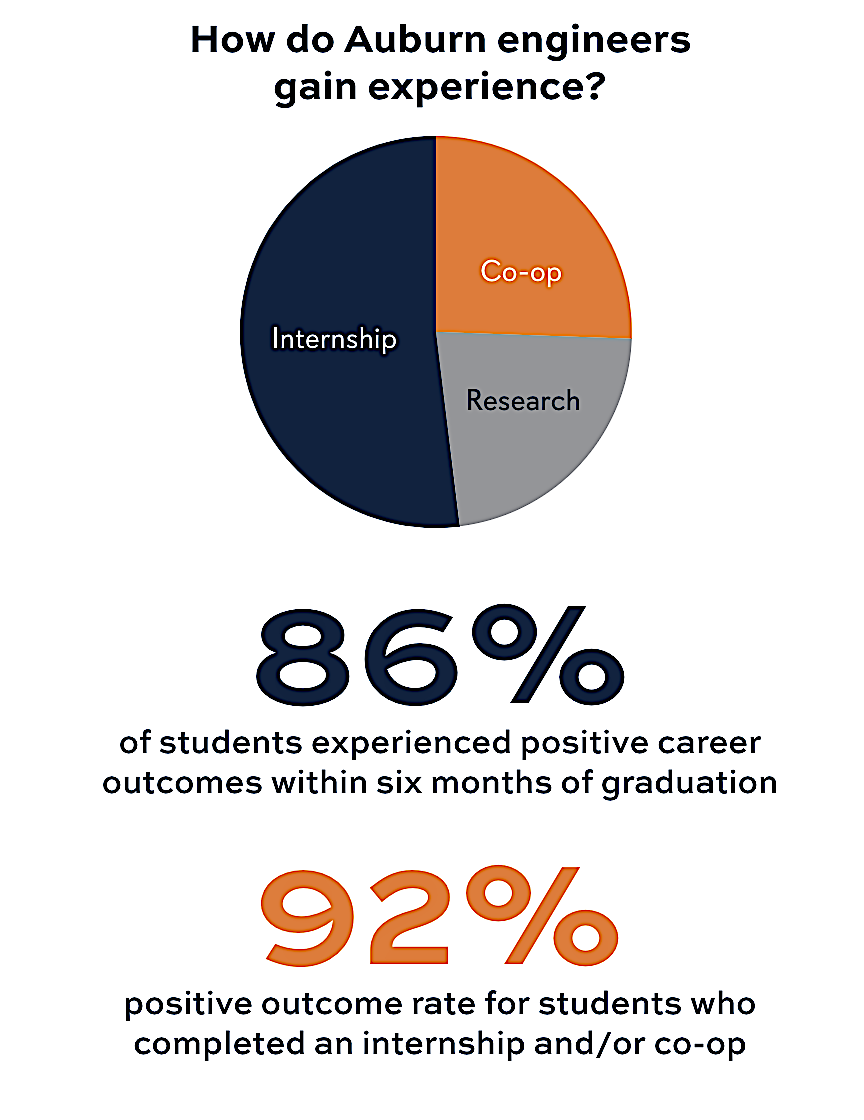
“Co-ops and internships are very important in making students marketable when they graduate for full-time engineering positions,” said Edie Irvin, assistant director for cooperative education and internships. “It takes the average college student between six and 18 months to get a job upon graduation. Co-op and internships let students put that job search in their collegiate career versus waiting until after graduation to start the search.”
Auburn University has a long history of cooperative education dating back to 1937.
The university’s co-op office joined CDCR in 2021 to be closer to the majority of the students it serves — more than 90% of all Auburn students who complete a co-op position are pursing engineering degrees. And employers can’t get enough.
“Employers are coming to us seeking out students for co-op positions and internships — the manufacturing industry especially,” Irvin said. “They can take a student through a deep dive into the company. I believe that’s why employers are coming to us. Number one, the quality of engineering students that Auburn puts out. But also, because we do have a program, we’ve been around since 1937. We can offer employers the structure they need to continue to hire those students.”
For Barragan, the value of the experience has been immeasurable.
“As a first-generation college student and the first engineer in my family, I figured the co-op program would be a great first step into understanding the industry side of engineering prior to graduation,” he said. “I hear from new alumni across engineering fields that they are not satisfied with their new positions right out of college mainly because they did not fully understand the role they were getting into. That is where the co-op program really blossoms as you get real-world experience in a role for a short term to really understand if that role or company is something that would interest you after graduation.”
It Comes Back to the Auburn Creed
“It’s a very exciting time for students to be able to graduate within engineering. The job market is there for them, but then I think the preparation that our career development staff does in helping students figure out what industry they want to be in, what they want to do, the direction they want to take in addition to just being prepared to present themselves and articulate their experiences to employers, I think that’s made a huge difference,” Mullins said.
Employers have taken note and the demand for Auburn Engineering students has never been stronger.
“The hiring of our students and the feedback we receive from employers is that our students are very, very well prepared,” Mullins said. “What our faculty are doing to prepare our students, technically, is very strong, but then I also think that our students have a practical piece to them — they know how to work. I really think it’s the Auburn Creed that sets our students apart from students at other schools of engineering.”
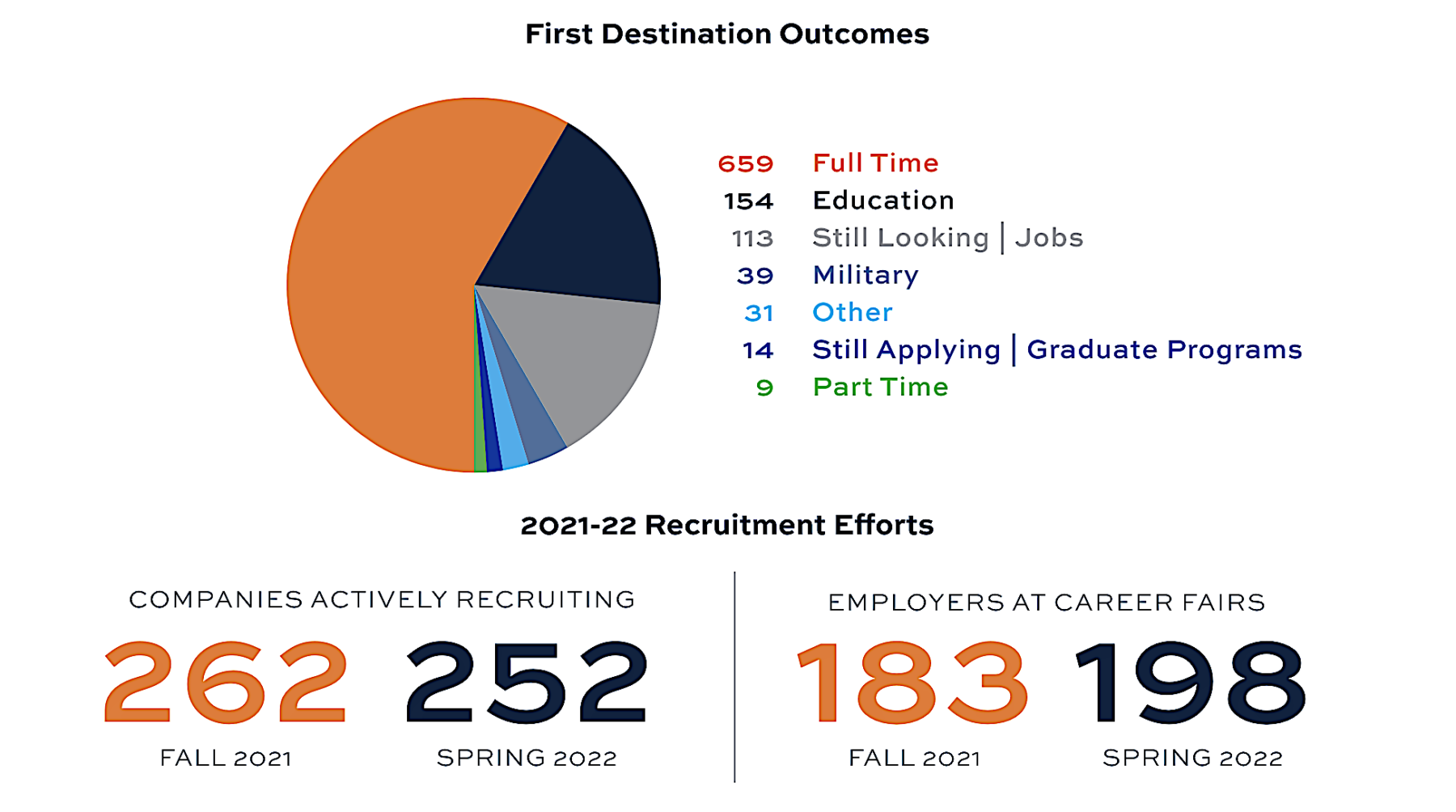
Mandy Ledkins, human resources manager for International Paper, agrees.
“As a lead recruiter at Auburn for International Paper, we enjoy interacting with such talented students in the Samuel Ginn College of Engineering,” Ledkins said. “It is crucial to our recruiting efforts around diversity that we continue to meet with all students on campus. Auburn students are well prepared and ready to join the workforce and have the ability to contribute immediately to the success of the company.”
Ledkins emphasized the tailored approach that the CDCR staff bring to their interactions with employers, working to make sure each company has the best experience on campus as possible to maximize their potential future employee pool.
“Apryl and her team strategize on ways each employer can be successful and align students with companies they know they will be successful joining,” Ledkins said. “This approach gives employers the ability to share with interested students the opportunities they have within their organization and that are good fits for companies.”
This customer service-based approach just makes sense to the CDCR team and it’s only one of the reasons why Auburn engineers enjoy such a high employment rate within six months of graduation.
“Students are having success and building a network through their interactions with our office,” Irvin said. “I think we’re helping them understand that the world is a lot bigger than Auburn, Alabama.”